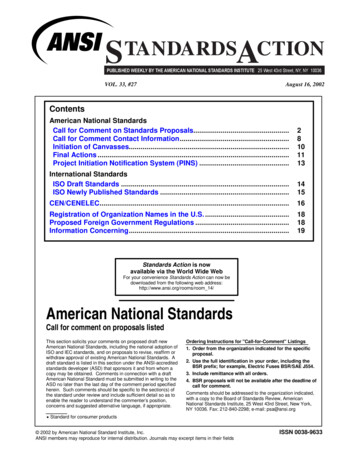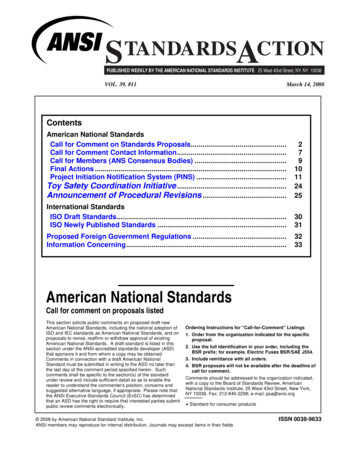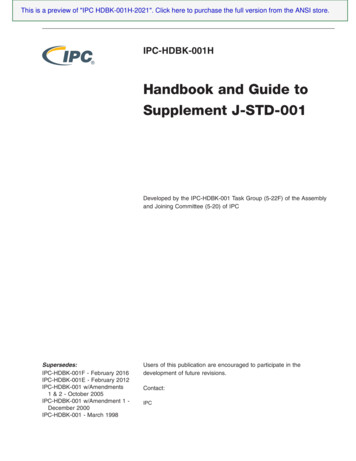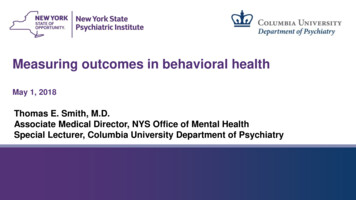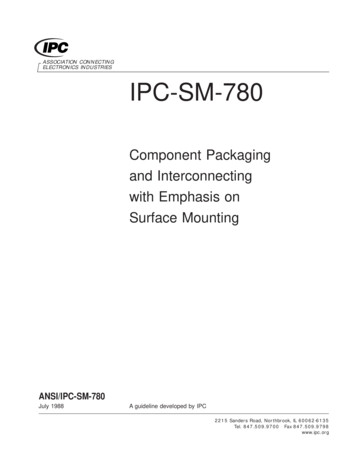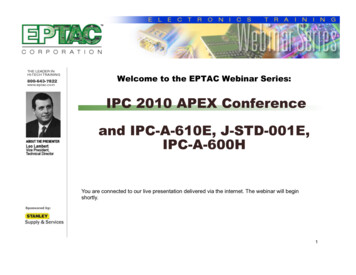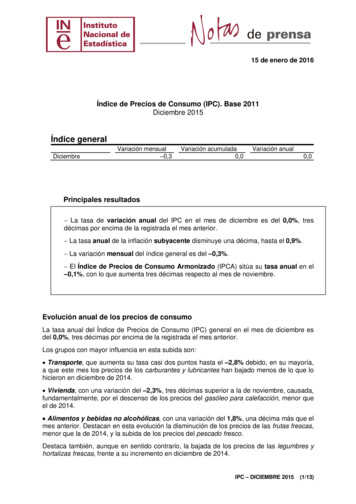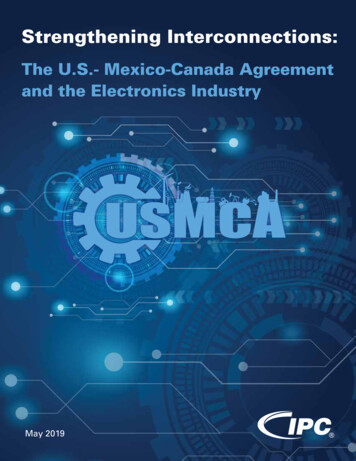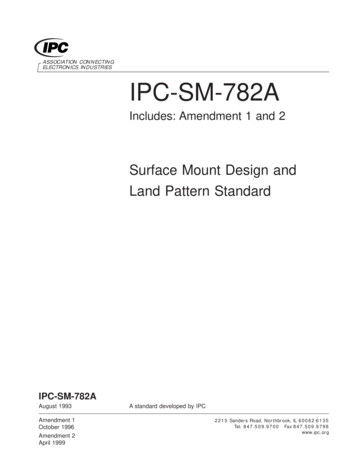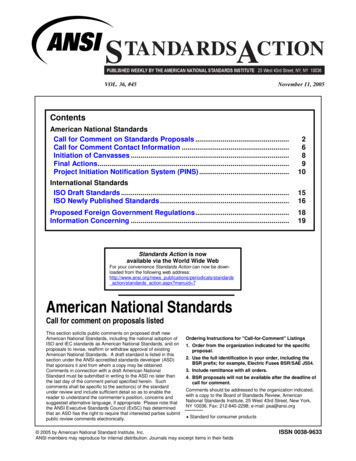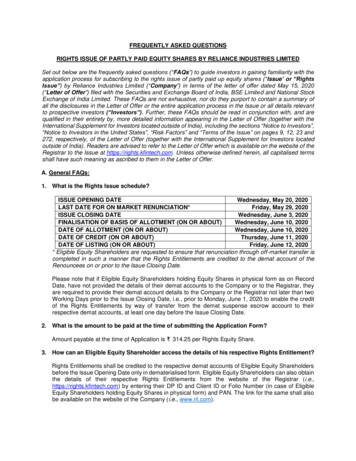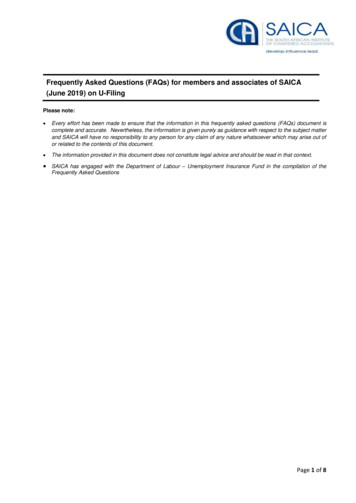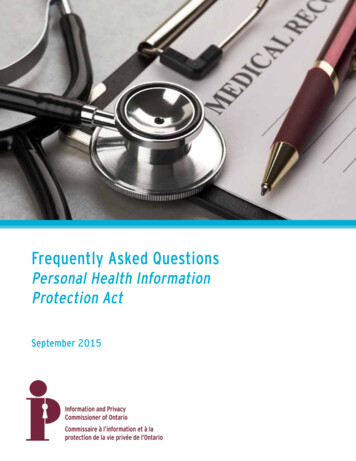
Transcription
Frequently Asked QuestionsPersonal Health InformationProtection ActSeptember 2015
This Frequently Asked Questions (FAQ) provides a generaloverview of the Personal Health Information Protection Actand Regulation 329/04. The information contained in thisdocument is for general reference purposes only and shouldnot be considered as legal advice. Legal counsel should beconsulted for all purposes of interpretation. This FAQ is notbinding on the Information and Privacy Commissioner ofOntario (IPC) and should not be construed to interfere withthe IPC’s ability to discharge its duties under the PersonalHealth Information Protection Act.This publication is also available on the IPC website.Cette publication est également disponible en français.
CONTENTSIntroduction. 1What is the Personal Health Information Protection Actand why is it necessary?. 1Overview. 3What is the purpose of PHIPA?. 3What rights do individuals have?. 3What is the relationship between PHIPA and the federal PersonalInformation Protection and Electronic Documents Act (PIPEDA)?. 4What is the relationship between PHIPA, the Freedom of Informationand Protection of Privacy Act (FIPPA) and the Municipal Freedom ofInformation and Protection of Privacy Act (MFIPPA)?. 5Interpretation and Application of PHIPA. 6To whom does PHIPA apply?. 6What is personal health information?. 6What does “health care” mean?. 7What is a custodian?. 7Is a health care practitioner working for a non-custodianconsidered to be a custodian? . 8What is an agent?. 9Does PHIPA apply to insurance companies or employers?. 10What is an electronic service provider?. 10What is a health information network provider?. 10Who is a prescribed person?. 11What is a prescribed entity?. 12Practices to Protect Personal Health Information. 13How does PHIPA protect personal health information?. 13What are the notification requirements in PHIPA in the eventof a breach?. 14Do custodians have responsibilities with respect to accountabilityand openness?. 14What are the requirements for the treatment of personalhealth records in the event of a change in practice?. 15Frequently Asked Questions: Personal Health Information Protection Act
Consent Concerning Personal Health Information. 16What are the requirements for consent?. 16What is the difference between express and implied consent?. 16When is express consent required?. 17When is implied consent sufficient?. 17What is the ‘circle of care’?. 18When can custodians assume implied consent?. 19Are pharmacists required to obtain express consent from anindividual to disclose personal health information to a third partybenefits payor?. 20Can individuals control what personal health information is recordedin their file?. 20Can individuals withdraw their consent?. 20What is a ‘lock-box’?. 21What are the restrictions and limitations on the lock-box?. 21What happens when an individual is incapable of providing consent?. 22Can a child under 16 years old provide consent?. 23Can another person, such as a family member, provide consenton an individual’s behalf when picking up or dropping offa prescription?. 23Collection, Use and Disclosure of Personal Health Information. 24What are the general limitations on the collection, use and disclosureof personal health information?. 24Collection. 24What is a collection of personal health informationunder PHIPA?. 24What are the rules regarding the collection of personal healthinformation?. 25When can custodians indirectly collect personalhealth information?. 25Use. 26What is a use of personal health information under PHIPA? . 26What are the rules regarding the use of personalhealth information?. 26When can personal health information be used without consent?. 26Frequently Asked Questions: Personal Health Information Protection Act
Disclosure. 27What is a disclosure of personal health informationunder PHIPA?. 27What are the rules regarding the disclosure of personalhealth information?. 27When can personal health information be disclosed withoutconsent?. 28Can personal health information be disclosed in the event ofan emergency?. 29Does PHIPA permit disclosure of personal health informationabout a deceased individual?. 30Can a custodian disclose personal health information to theWorkplace Safety and Insurance Board (WSIB) about an injuredworker without the individual’s consent?. 31Can a custodian store, access or disclose personal healthinformation outside of Ontario?. 31Fundraising and Marketing. 33Can custodians collect, use or disclose personal health informationfor fundraising activities?. 33Can personal health information be collected, used or disclosed formarketing purposes?. 34Research. 35What are the requirements for the collection, use and disclosureof personal health information for research?. 35Are there any requirements for research ethics boards andresearch plans?. 36Ontario Health Cards and Health Numbers. 37Who can collect, use or disclose Ontario health numbers andunder what circumstances?. 37Are other organizations permitted to request the productionof a health card?. 37Access to Records of personal Health Information and Correction. 39Access. 39Are individuals permitted to access their own personal healthinformation?. 39Frequently Asked Questions: Personal Health Information Protection Act
How do an individual obtain access to their personalhealth information?. 40How long does a custodian have to respond to an individual’srequest for access to personal health information?. 40Can a custodian refuse to provide access to an individual’spersonal health information?. 41Is there a fee associated with an access request?. 41What if the custodian works for a non-custodian that is coveredunder public sector access and privacy legislation, such as aschool board or municipality?. 42Correction. 42Can individuals correct errors in their personalhealth information?. 42How does an individual correct errors?. 43Can a custodian refuse to correct an individual’s personal healthinformation?. 43Administration and Enforcement. 44How is PHIPA enforced?. 44How does an individual initiate a complaint?. 44Is there a time limit within which an individual may complain?. 45If a person is not satisfied with an IPC order, what can be done?. 45Can a person seek compensation for damages? . 45What is an offence under PHIPA?. 45What are the consequences for committing an offenceunder PHIPA?. 46Who is responsible for prosecuting offences under PHIPA?. 46Frequently Asked Questions: Personal Health Information Protection Act
INTRODUCTIONWHAT IS THE PERSONAL HEALTH INFORMATIONPROTECTION ACT AND WHY IS IT NECESSARY?The Personal Health Information Protection Act (PHIPA) is Ontario’s healthspecific privacy legislation which came into force on November 1, 2004. PHIPAgoverns the manner in which personal health information may be collected, usedand disclosed within the health sector. It regulates health information custodians(custodians), as well as individuals and organizations that receive personal healthinformation from custodians.Personal health information is among the most sensitive of personalinformation. People are understandably protective about sharing personaldetails relating to their medical conditions. At the same time, personal healthinformation must flow freely between health care practitioners in order toensure the best care for patients.The nature of our health system is that personal health information passesthrough many links in the health care chain: from a doctor’s office, to a referralto a specialist, to a medical lab, to a hospital or to an insurance company forreimbursement of claims. There are many circumstances in which personal healthinformation must be readily, as well as expeditiously shared, such as in the caseof a medical emergency. Beyond patient care, personal health information isneeded for important activities, such as health research which is vital to developnew treatments and cures.PHIPA creates a consistent approach to protecting personal health informationacross the health sector. The legislation was designed to give individualsgreater control over how their personal health information is collected, used ordisclosed. PHIPA balances the privacy rights of individuals with the legitimateneed of custodians to collect, use and disclose personal health information inorder to deliver effective and timely health care and to plan and manage ourpublicly funded health system.With limited exceptions, PHIPA requires custodians to obtain consent beforepersonal health information is collected, used or disclosed. In addition, PHIPAprovides individuals with a right to access and request correction of theirpersonal health information. PHIPA also provides a means for redress throughthe Office of the Information and Privacy Commissioner of Ontario (IPC) whenprivacy rights relating to personal health information have been violated.Frequently Asked Questions: Personal Health Information Protection Act1
What is thePersonal HealthInformationProtection Actand why is itnecessary?2The IPC is the designated oversight body responsible for administeringand enforcing these health sector privacy rules. As such, we have preparedthe following questions and answers to guide Ontarians and custodians inunderstanding their respective privacy rights and obligations.Frequently Asked Questions: Personal Health Information Protection Act
OVERVIEWWHAT IS THE PURPOSE OF PHIPA?PHIPA establishes rules for the collection, use and disclosure of personal healthinformation and includes provisions that: require consent for the collection, use and disclosure of personal healthinformation, with necessary but limited exceptions, require that custodians treat all personal health information as confidentialand keep it secure, provide individuals with a right of access to their personal healthinformation, as well as the right to correct errors, give individuals the right to withhold or withdraw consent to the collection,use or disclosure of personal health information or to expressly instructcustodians not to use or disclose their personal health information forhealth care purposes, establish clear rules for the collection, use and disclosure of personalhealth information for fundraising and marketing purposes, set guidelines for the collection, use and disclosure of personal healthinformation for research purposes, ensure accountability by granting individuals the right to complain to theIPC about the practices of custodians and establish remedies for breaches of the legislation.WHAT RIGHTS DO INDIVIDUALS HAVE?PHIPA gives individuals the right to: be informed of the purposes for the collection, use and disclosure ofpersonal health information, be notified by a custodian if personal health information has been stolen,lost or accessed by unauthorized persons, refuse or give consent to the collection, use or disclosure of personalhealth information, except in circumstances specified in PHIPA,Frequently Asked Questions: Personal Health Information Protection Act3
What rights doindividuals have? withdraw consent by providing notice to the custodian, expressly instruct a custodian not to use or disclose personal healthinformation for health care purposes without consent, access a copy of their own personal health information, except in limitedcircumstances specified in PHIPA, request corrections to be made to their personal health information, complain to the IPC about a custodian’s refusal to give access to all orpart of a record of personal health information, complain to the IPC about a custodian’s refusal to grant a correctionrequest, complain to the IPC about any breach or potential breach of PHIPA or itsregulations and begin a proceeding in court for damages for actual harm suffered, ifaffected by a final order or conduct leading to a final conviction for anoffence under PHIPA.PHIPA establishes a formal process for individuals to access and correcttheir personal health information, within specified time frames and the right tocomplain if an access or correction request is denied.WHAT IS THE RELATIONSHIP BETWEEN PHIPA AND THEFEDERAL PERSONAL INFORMATION PROTECTION ANDELECTRONIC DOCUMENTS ACT (PIPEDA)?The collection, use and disclosure of personal information within the commercialsector is regulated by federal privacy legislation—the Personal InformationProtection and Electronic Documents Act. PIPEDA was enacted to regulate thecollection, use or disclosure of personal information in the hands of private sectororganizations. PIPEDA does not apply to personal information in provinces andterritories that have “substantially similar” privacy legislation in place.The federal government has deemed PHIPA to be “substantially similar” toPIPEDA. Custodians and their agents are exempted from having to comply withthe provisions of PIPEDA to the extent that they collect, use and disclose personalhealth information within Ontario. PIPEDA continues to apply to all commercialactivities relating to the exchange of personal health information betweenprovinces and territories and to information transfers outside of Canada.4Frequently Asked Questions: Personal Health Information Protection Act
WHAT IS THE RELATIONSHIP BETWEEN PHIPA, THEFREEDOM OF INFORMATION AND PROTECTION OFPRIVACY ACT (FIPPA) AND THE MUNICIPAL FREEDOMOF INFORMATION AND PROTECTION OF PRIVACY ACT(MFIPPA)?Organizations that are both custodians under PHIPA and institutions underpublic sector privacy and access to information legislation, namely the provincialFIPPA or its municipal counterpart MFIPPA, include hospitals, the OntarioAgency for Health Protection and Promotion, the Ministry of Health and LongTerm Care, medical officers of health and municipally operated long-term carehomes and ambulance services.The general rule is that, subject to certain exceptions, a custodian that is also aninstitution or a part of an institution is governed by PHIPA, not FIPPA or MFIPPA,with respect to personal health information in its custody or under its control.All other recorded information about an individual that is not personal healthinformation and that is in the custody or under the control of an organization thatis both a custodian and an institution or part of an institution is subject to FIPPAor MFIPPA, as the case may be.PHIPA also contains provisions that are specific to custodians that areinstitutions. For example, PHIPA provides a number of exceptions to the generalrule that custodians are only permitted to collect personal health informationdirectly from the individual to whom the information relates. In addition to theexceptions available to all custodians, a custodian that is also an institutionunder FIPPA or MFIPPA may collect personal health information indirectly for apurpose related to investigating a breach of an agreement or a contravention oralleged contravention of laws of Ontario or Canada, the conduct of a proceedingor possible proceeding or the statutory function of the custodian.For further information, please see the IPC documents Applying PHIPA andFIPPA/MFIPPA to Personal Health Information, Freedom of Information at OntarioHospitals: Frequently Asked Questions, and Applying PHIPA and FIPPA toPersonal Health Information: Guidance for Hospitals.Frequently Asked Questions: Personal Health Information Protection Act5
INTERPRETATION ANDAPPLICATION OF PHIPATO WHOM DOES PHIPA APPLY?PHIPA applies to a wide variety of persons and organizations defined as healthinformation custodians. PHIPA also applies to agents who are authorized toact for or on behalf of custodians. Additionally, PHIPA applies to the use anddisclosure of personal health information by those who receive personal healthinformation from custodians (recipients) and to electronic service providers,including health information network providers.WHAT IS PERSONAL HEALTH INFORMATION?Personal health information is “identifying information” about an individual,whether oral or recorded if the information: relates to the individual’s physical or mental condition, including familymedical history, relates to the provision of health care to the individual, is a plan of service for the individual, relates to payments, or eligibility for health care or for coverage for healthcare, relates to the donation of any body part or bodily substance or is derivedfrom the testing or examination of any such body part or bodily substance, is the individual’s health number or identifies a health care provider or a substitute decision-maker for theindividual.“Identifying information” includes information that identifies an individual or forwhich it is reasonably foreseeable that it could be used, either alone or withother information, to identify an individual.Personal health information includes identifying information that is not personalhealth information but that is contained in a record that contains personal healthinformation. Personal health information does not include identifying information6Frequently Asked Questions: Personal Health Information Protection Act
about an employee or agent of the custodian that is not maintained primarily forthe provision of health care. For example, a doctor’s note to support an absencefrom work in the personnel file of a secretary employed by a custodian is notpersonal health information.What ispersonal healthinformation?WHAT DOES “HEALTH CARE” MEAN?“Health care” means any observation, examination, assessment, care,service or procedure that is done for a health-related purpose and that iscarried out or provided: for diagnosis, treatment or maintenance of an individual’s physical ormental condition, for prevention of disease or injury or the promotion of health or as part of palliative care.It also includes: the compounding, dispensing or selling of a drug, device or equipmentpursuant to a prescription, a community service that is described in the Home Care and CommunityServices Act and taking blood or a blood product donation from an individual.WHAT IS A CUSTODIAN?A custodian is a person or organization listed in PHIPA that, as a result of his,her or its power or duties or work set out in PHIPA, has custody or control ofpersonal health information. Examples of custodians include: health care practitioners, (including doctors, nurses, speech-languagepathologists, chiropractors, dental professionals, dieticians, medicallaboratory technologists, massage therapists, midwives, occupationaltherapists, opticians and physiotherapists), community care access corporations, hospitals, psychiatric facilities, long-term care homes,Frequently Asked Questions: Personal Health Information Protection Act7
What is acustodian? pharmacies, laboratories, ambulance services, retirement homes and homes for special care, medical officers of health of boards of health, the Minister of Health and Long-Term Care and Canadian Blood Services.A custodian does not include: a health care practitioner, service provider, evaluator or assessor who is anagent of a custodian, a person authorized to act for or on behalf of a person that is not acustodian, if the scope of duties of the authorized person does not includethe provision of health care, an aboriginal healer who provides traditional healing services to aboriginalpersons or members of an aboriginal community, an aboriginal midwife who provides traditional midwifery services toaboriginal persons or members of an aboriginal community and a person who provides treatment solely by spiritual means or by prayer.IS A HEALTH CARE PRACTITIONER WORKING FOR ANON-CUSTODIAN CONSIDERED TO BE A CUSTODIAN?A health care practitioner, who provides health care, but who contracts with, isemployed by or volunteers for an organization that is not defined as a custodianunder PHIPA, would fall within the definition of a custodian under PHIPA andmust comply with all requirements for custodians.Examples of custodians who work for non-custodians include: a nurse employed by a school board to provide health care services tostudents, a doctor employed by a professional sports team in order to diagnosesporting injuries,8Frequently Asked Questions: Personal Health Information Protection Act
a registered massage therapist providing health care services to clients ofa spa andIs a health carepractitionerworking for a a nurse employed in-house by a manufacturing firm in a health care capacity.non-custodianconsidered to be aA custodian cannot disclose personal health information to a non-custodian,custodian?including the non-custodian for whom the individual is working, unless theindividual whose personal health information is at issue has given expressconsent or the disclosure is permitted or required by PHIPA or another law.For further information, please see the IPC fact sheet, Health InformationCustodians Working for Non-Health Information Custodians.WHAT IS AN AGENT?PHIPA defines an agent to include any person who is authorized by a custodianto perform services or activities in respect of personal health information on thecustodian’s behalf and for the purposes of that custodian.An agent may include a person or company that contracts with, is employedby or volunteers for a custodian and, as a result, may have access to personalhealth information. PHIPA permits custodians to provide personal healthinformation to their agents only if the custodian is permitted to collect, use,disclose, retain or dispose of the information.For example, an agency relationship under PHIPA includes a nurse who isemployed by, or a student who volunteers at, a hospital. An agency relationshipmay also include a physician who is not employed by a hospital, but hasadmitting privileges to use the hospital’s equipment or facilities. In such cases,the custodian hospital is permitted to authorize the agent to handle or deal withpersonal health information on its behalf, as long as the agent complies withPHIPA and adopts the information practices of the custodian. An agent mustnotify the custodian if the personal health information the agent is handling isstolen, lost or accessed by unauthorized persons.The custodian remains accountable for the personal health information in itscustody or under its control, even where the agent is authorized to act on itsbehalf with respect to that personal health information. The custodian alsoremains accountable for the personal health information in its custody or underits control where the agent acted beyond what was authorized by the custodian.For example, in Order HO-013, employees were found to be agents when theyused and/or disclosed personal health information in the custody or under thecontrol of a hospital for the purpose of selling or marketing Registered EducationSaving Plans. The custodian hospital was accountable for the contravention ofPHIPA, even though the agents may have acted beyond the authority delegatedby the hospital.Frequently Asked Questions: Personal Health Information Protection Act9
DOES PHIPA APPLY TO INSURANCE COMPANIES OREMPLOYERS?Certain organizations, such as insurance companies and employers, who mayhold personal health information in their files, are not governed by PHIPA, unlessthey receive personal health information from a custodian. When an insurancecompany or employer receives personal health information from a custodian,the receiving entity may, in general, only use or disclose the information for theauthorized purpose for which the information was disclosed or for the purposeof carrying out a statutory or legal duty. This rule is colloquially referred to as the“recipient rule.”However, an exception to the recipient rule applies to insurance providers thatreceive personal health information from a pharmacist. In that situation, PHIPApermits the insurance provider to disclose personal health information to thepharmacist to assist the pharmacist in advising the individual or providing theindividual with health care. For example, the insurance provider may disclose toa pharmacist the types of medications an individual has purchased from differentpharmacies so that the pharmacist may advise of any incompatible prescriptions.WHAT IS AN ELECTRONIC SERVICE PROVIDER?An electronic service provider is a person who supplies services that enable acustodian to collect, use, modify, disclose, retain or dispose of personal healthinformation electronically. If the electronic service provider is not an agent of thecustodian, then it shall not use any personal health information to which it hasaccess in the course of providing services to the custodian, except as necessaryin the course of providing the service and it cannot disclose the information.Electronic service providers must also ensure their employees or any otherpersons acting on their behalf agree to comply with these restrictions.WHAT IS A HEALTH INFORMATION NETWORK PROVIDER?PHIPA contains requirements that apply to a specific type of electro
September 2015. This Frequently Asked Questions (FAQ) provides a general overview of the Personal Health Information Protection Act and Regulation 329/04. The information contained in this document is for general reference purposes only and should not be considered as legal advice. Legal counsel should be
